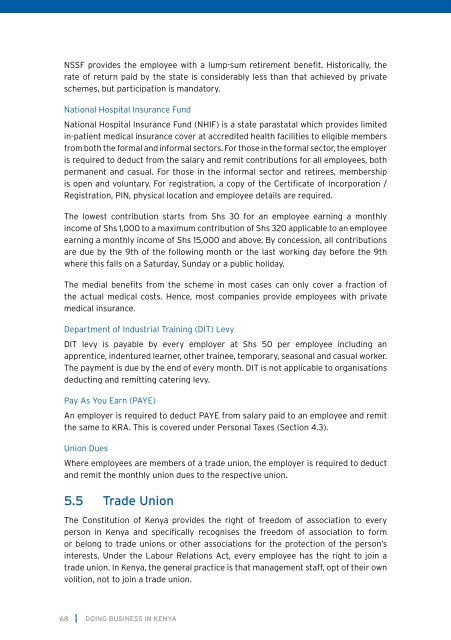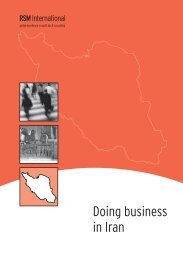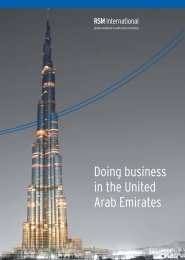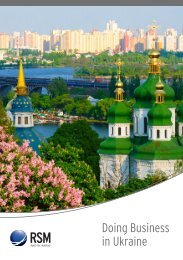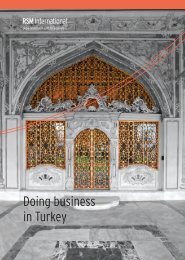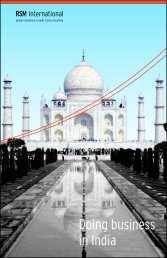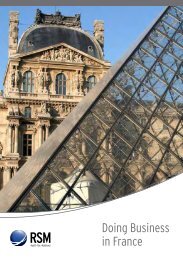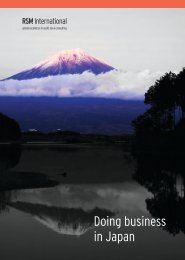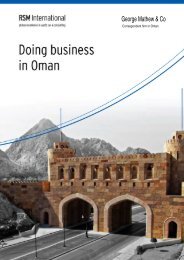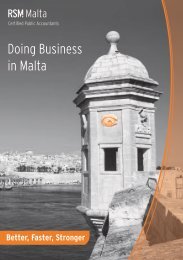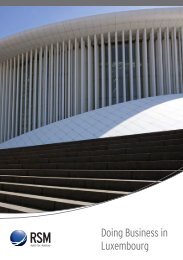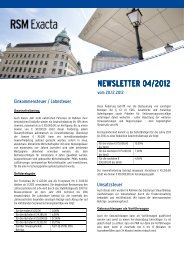Doing Business in Kenya - RSM International
Doing Business in Kenya - RSM International
Doing Business in Kenya - RSM International
- No tags were found...
Create successful ePaper yourself
Turn your PDF publications into a flip-book with our unique Google optimized e-Paper software.
NSSF provides the employee with a lump-sum retirement benefit. Historically, therate of return paid by the state is considerably less than that achieved by privateschemes, but participation is mandatory.National Hospital Insurance FundNational Hospital Insurance Fund (NHIF) is a state parastatal which provides limited<strong>in</strong>-patient medical <strong>in</strong>surance cover at accredited health facilities to eligible membersfrom both the formal and <strong>in</strong>formal sectors. For those <strong>in</strong> the formal sector, the employeris required to deduct from the salary and remit contributions for all employees, bothpermanent and casual. For those <strong>in</strong> the <strong>in</strong>formal sector and retirees, membershipis open and voluntary. For registration, a copy of the Certificate of Incorporation /Registration, PIN, physical location and employee details are required.The lowest contribution starts from Shs 30 for an employee earn<strong>in</strong>g a monthly<strong>in</strong>come of Shs 1,000 to a maximum contribution of Shs 320 applicable to an employeeearn<strong>in</strong>g a monthly <strong>in</strong>come of Shs 15,000 and above. By concession, all contributionsare due by the 9th of the follow<strong>in</strong>g month or the last work<strong>in</strong>g day before the 9thwhere this falls on a Saturday, Sunday or a public holiday.The medial benefits from the scheme <strong>in</strong> most cases can only cover a fraction ofthe actual medical costs. Hence, most companies provide employees with privatemedical <strong>in</strong>surance.Department of Industrial Tra<strong>in</strong><strong>in</strong>g (DIT) LevyDIT levy is payable by every employer at Shs 50 per employee <strong>in</strong>clud<strong>in</strong>g anapprentice, <strong>in</strong>dentured learner, other tra<strong>in</strong>ee, temporary, seasonal and casual worker.The payment is due by the end of every month. DIT is not applicable to organisationsdeduct<strong>in</strong>g and remitt<strong>in</strong>g cater<strong>in</strong>g levy.Pay As You Earn (PAYE)An employer is required to deduct PAYE from salary paid to an employee and remitthe same to KRA. This is covered under Personal Taxes (Section 4.3).Union DuesWhere employees are members of a trade union, the employer is required to deductand remit the monthly union dues to the respective union.5.5 Trade UnionThe Constitution of <strong>Kenya</strong> provides the right of freedom of association to everyperson <strong>in</strong> <strong>Kenya</strong> and specifically recognises the freedom of association to formor belong to trade unions or other associations for the protection of the person’s<strong>in</strong>terests. Under the Labour Relations Act, every employee has the right to jo<strong>in</strong> atrade union. In <strong>Kenya</strong>, the general practice is that management staff, opt of their ownvolition, not to jo<strong>in</strong> a trade union.68DOING BUSINESS IN KENYA


